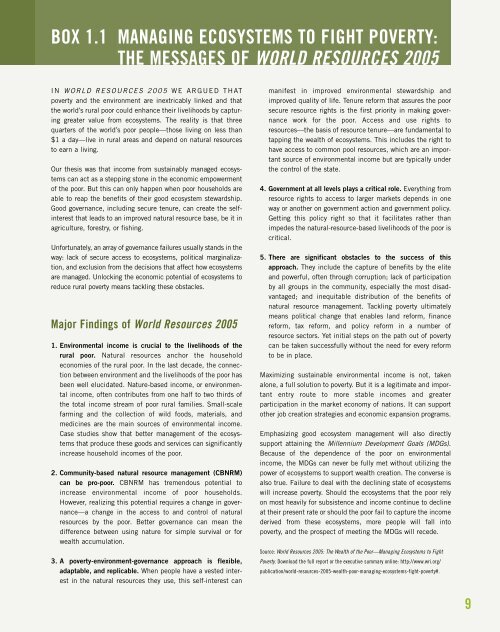Growing the Wealth of the Poor - World Resources Institute
Growing the Wealth of the Poor - World Resources Institute
Growing the Wealth of the Poor - World Resources Institute
Create successful ePaper yourself
Turn your PDF publications into a flip-book with our unique Google optimized e-Paper software.
BOX 1.1 MANAGING ECOSYSTEMS TO FIGHT POVERTY:THE MESSAGES OF WORLD RESOURCES 2005I N W O R L D R E S O U R C E S 2 0 0 5 W E A R G U E D T H ATpoverty and <strong>the</strong> environment are inextricably linked and that<strong>the</strong> world’s rural poor could enhance <strong>the</strong>ir livelihoods by capturinggreater value from ecosystems. The reality is that threequarters <strong>of</strong> <strong>the</strong> world’s poor people—those living on less than$1 a day—live in rural areas and depend on natural resourcesto earn a living.Our <strong>the</strong>sis was that income from sustainably managed ecosystemscan act as a stepping stone in <strong>the</strong> economic empowerment<strong>of</strong> <strong>the</strong> poor. But this can only happen when poor households areable to reap <strong>the</strong> benefits <strong>of</strong> <strong>the</strong>ir good ecosystem stewardship.Good governance, including secure tenure, can create <strong>the</strong> selfinterestthat leads to an improved natural resource base, be it inagriculture, forestry, or fishing.Unfortunately, an array <strong>of</strong> governance failures usually stands in <strong>the</strong>way: lack <strong>of</strong> secure access to ecosystems, political marginalization,and exclusion from <strong>the</strong> decisions that affect how ecosystemsare managed. Unlocking <strong>the</strong> economic potential <strong>of</strong> ecosystems toreduce rural poverty means tackling <strong>the</strong>se obstacles.Major Findings <strong>of</strong> <strong>World</strong> <strong>Resources</strong> 20051. Environmental income is crucial to <strong>the</strong> livelihoods <strong>of</strong> <strong>the</strong>rural poor. Natural resources anchor <strong>the</strong> householdeconomies <strong>of</strong> <strong>the</strong> rural poor. In <strong>the</strong> last decade, <strong>the</strong> connectionbetween environment and <strong>the</strong> livelihoods <strong>of</strong> <strong>the</strong> poor hasbeen well elucidated. Nature-based income, or environmentalincome, <strong>of</strong>ten contributes from one half to two thirds <strong>of</strong><strong>the</strong> total income stream <strong>of</strong> poor rural families. Small-scalefarming and <strong>the</strong> collection <strong>of</strong> wild foods, materials, andmedicines are <strong>the</strong> main sources <strong>of</strong> environmental income.Case studies show that better management <strong>of</strong> <strong>the</strong> ecosystemsthat produce <strong>the</strong>se goods and services can significantlyincrease household incomes <strong>of</strong> <strong>the</strong> poor.2. Community-based natural resource management (CBNRM)can be pro-poor. CBNRM has tremendous potential toincrease environmental income <strong>of</strong> poor households.However, realizing this potential requires a change in governance—achange in <strong>the</strong> access to and control <strong>of</strong> naturalresources by <strong>the</strong> poor. Better governance can mean <strong>the</strong>difference between using nature for simple survival or forwealth accumulation.3. A poverty-environment-governance approach is flexible,adaptable, and replicable. When people have a vested interestin <strong>the</strong> natural resources <strong>the</strong>y use, this self-interest canmanifest in improved environmental stewardship andimproved quality <strong>of</strong> life. Tenure reform that assures <strong>the</strong> poorsecure resource rights is <strong>the</strong> first priority in making governancework for <strong>the</strong> poor. Access and use rights toresources—<strong>the</strong> basis <strong>of</strong> resource tenure—are fundamental totapping <strong>the</strong> wealth <strong>of</strong> ecosystems. This includes <strong>the</strong> right tohave access to common pool resources, which are an importantsource <strong>of</strong> environmental income but are typically under<strong>the</strong> control <strong>of</strong> <strong>the</strong> state.4. Government at all levels plays a critical role. Everything fromresource rights to access to larger markets depends in oneway or ano<strong>the</strong>r on government action and government policy.Getting this policy right so that it facilitates ra<strong>the</strong>r thanimpedes <strong>the</strong> natural-resource-based livelihoods <strong>of</strong> <strong>the</strong> poor iscritical.5. There are significant obstacles to <strong>the</strong> success <strong>of</strong> thisapproach. They include <strong>the</strong> capture <strong>of</strong> benefits by <strong>the</strong> eliteand powerful, <strong>of</strong>ten through corruption; lack <strong>of</strong> participationby all groups in <strong>the</strong> community, especially <strong>the</strong> most disadvantaged;and inequitable distribution <strong>of</strong> <strong>the</strong> benefits <strong>of</strong>natural resource management. Tackling poverty ultimatelymeans political change that enables land reform, financereform, tax reform, and policy reform in a number <strong>of</strong>resource sectors. Yet initial steps on <strong>the</strong> path out <strong>of</strong> povertycan be taken successfully without <strong>the</strong> need for every reformto be in place.Maximizing sustainable environmental income is not, takenalone, a full solution to poverty. But it is a legitimate and importantentry route to more stable incomes and greaterparticipation in <strong>the</strong> market economy <strong>of</strong> nations. It can supporto<strong>the</strong>r job creation strategies and economic expansion programs.Emphasizing good ecosystem management will also directlysupport attaining <strong>the</strong> Millennium Development Goals (MDGs).Because <strong>of</strong> <strong>the</strong> dependence <strong>of</strong> <strong>the</strong> poor on environmentalincome, <strong>the</strong> MDGs can never be fully met without utilizing <strong>the</strong>power <strong>of</strong> ecosystems to support wealth creation. The converse isalso true. Failure to deal with <strong>the</strong> declining state <strong>of</strong> ecosystemswill increase poverty. Should <strong>the</strong> ecosystems that <strong>the</strong> poor relyon most heavily for subsistence and income continue to declineat <strong>the</strong>ir present rate or should <strong>the</strong> poor fail to capture <strong>the</strong> incomederived from <strong>the</strong>se ecosystems, more people will fall intopoverty, and <strong>the</strong> prospect <strong>of</strong> meeting <strong>the</strong> MDGs will recede.Source: <strong>World</strong> <strong>Resources</strong> 2005: The <strong>Wealth</strong> <strong>of</strong> <strong>the</strong> <strong>Poor</strong>—Managing Ecosystems to FightPoverty. Download <strong>the</strong> full report or <strong>the</strong> executive summary online: http://www.wri.org/publication/world-resources-2005-wealth-poor-managing-ecosystems-fight-poverty#.9
















